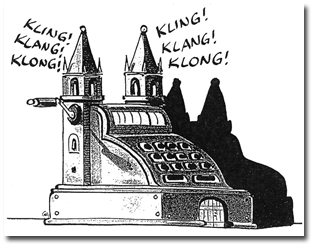
After the Napoleonic Wars, church properties were confiscated by the German state, the Catholic Church in Germany received in recompense the Church Tax. All Catholics who are officially registered with the state as Catholics must pay a small percentage of their income as the Church Tax, Kirchensteuer. Post-war prosperity swelled the coffers of the Church ( a tax of $11 Billion in 2010) and enabled it to construct an immense bureaucracy. When Ratzinger went to the Vatican he marveled that it has fewer employees than the archdiocese of Munich.
There is only one way not to pay the tax. Catholics can go to a state office and declare that they are no longer members of the Catholic Church and therefore are not subject to the Church tax. Many did this during the 1930s under Nazi pressure. Recently the numbers of those leaving the Church have swelled. Some have lost faith, others don’t want to pay the tax, others are unhappy because of the sexual abuse scandals in Germany.
Fewer Catholics paying Church tax = less money = CRISIS.
Frankfurter Allgemeine Zeitung reports that the German bishops have taken a strong stand.
Anyone who wants to go off the official government roles as a tax paying Catholic must go before a representative of the Church who will explain to him that if he stops paying Church tax he will
- Not be able to receive the sacraments
- Cannot serve as a godparent
- Cannot be a member of a Catholic organization
- May be fired if he works in apposition which requires an official mission from the Church (i.e., teacher of religion
- May be denied Catholic funeral rites and burial.
Some Germans claimed when could fulfill the obligation to support the Church financially without paying the Church tax, but Benedict XVI and Cardinal Gerhard Müller, the head of the Congregation for the Doctrine of the Faith, have approved the German bishops’ decree and given it the force of canon law.
Oh, my. So one can be a heretical theologian and not suffer all those consequences, or even be a public sinner and public opponent of morality, and not suffer all those consequences, but if you take your name off the tax roll for the Church, you are worse than excommunicated!?
And last but not least:
He may go to hell.
This is what happens when the church aligns itself too closely with the state. It becomes dependent on state financing to survive, and it focuses its attention on being loyal to the leadership classes to the exclusion of its stated mission, let alone to anyone outside those classes. It’s not just a Catholic problem. The Church of England’s spiritual impotence can be traced to its tight relationship to the monarchy. The Russian Orthodox Church sold its soul for the idea of Moscow as the “Third Rome.” Calvin in Geneva and Cromwell in England were not exactly models of true justice or mercy. Luther needed the backing of German nobles to succeed; he repaid them by supporting them in the abortive “Peasants’ Revolt.”
By the same token, if one no longer is a member of the Catholic Church, then why should he receive the sacraments? Nevertheless, why should religious membership be determined by who pays a tax?
The Catholics in Germany shold reject this tax and tell the hierarchy that all contribtions will be voluntary and anonymous from now on. They can’t deny the sacraments if they don’t know who’s giving or not.
For a good commentary on the church tax, go to: http://mundabor.wordpress.com/2012/09/mundabors-suggestion-to-good-german-catholics-who-are-fed-up-with-the-kirchensteuer
Made a mistake. The right url is: http://mundabor.wordpress.com/2012/09/21mundabors-suggestion-to-good-german-catholics-who-are-fed-up-with-the-kirchensteur
Finally: http://mundabor.wordpress.com/2012/09/21/mundabors-suggestion-to-good-german-catholics-fed-up-with-the-kirchensteuer
Okay, http://mundabor.wordpress.com/2012/09/21/mundabors-suggestion-to-good-germans-catholics-who-are-fed-up-with-the-kirchensteuer
Is there a “preferential option” for the “poor and the marginalized” so they can be churched withiut having to pay the tax?
But maybe there are no “poor and marginalized” according to American standards in Germany. It wouldn’t surprise me given the national work ethic—in Germany.
How does this work for non Catholic churches in Germany, the Lutherans for instance?
It’s a terrible system made to order for driving people out of the church or holding them in through superstitious fear.
Leon, it’s not enough to complain about bishops as rich bureaucrats. The current system is dying. It’s a holdover from the Industrial Age. The Agricultural Age bishop was a land-holding feudal prince. The Industrial Age re-invented the bishop as a bureaucrat, with his wealth in the form of “programs,” including schools and hospitals, which commanded donations.
But the Industrial Age is gone, we are in a new age, and the role of the bishop (and a lot of other churchly things) will inevitably change.
Therefore, we need to think. We need to start thinking about what the Church might be like in the Information Age. No one else will do it. The “experts” and wise men are all part of the problem–they can’t think outside the box.
The numbers say the current system is not sustainable. We are losing four and recruiting one. This can’t go on. Catastrophe, but also, perhaps, a golden age for cranky outsiders. Such as you.